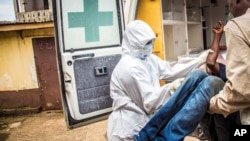Ebola is wrecking years of health and education work in Sierra Leone and Liberia following their civil wars, forcing many charity groups to suspend operations or re-direct them to fighting the epidemic.
More than a decade of peace and quickening economic growth had raised hopes that the nations could finally reduce their dependency on foreign aid and budgetary support; now Ebola has undermined those achievements, charity workers and officials say.
“The impact of Ebola will take us completely back to it being a basket case,” said Rocco Falconer, CEO of educational charity Planting Promise in Sierra Leone. “The impact on some activities have been simply catastrophic.”
The two countries worst hit by Ebola have struggled to recover from the wars that raged through the 1990s until early in the 21st century, killing and maiming tens of thousands, and devastating already poor infrastructure.
In Sierra Leone, aid made up one-fifth of economic output in 2010, according to officials, though this had been shrinking as growth accelerated thanks to a boom in the country's commodities exports. Britain and the European Union are the main donors with funds directed to health, education and social assistance.
But Planting Promise's experience typifies the problems of non-government organizations (NGOs) since Ebola hit West Africa, infecting more than 20,000 people and killing nearly 8,000.
It had spent six years in Sierra Leone developing farms and using the profits to fund local schools. The project had just become self-financing for the first time when the outbreak was detected in March.
After that, things fell apart. Planting Promise was forced to withdraw its expatriate staff in June and the following month it closed its five primary schools where nearly 1,000 pupils had studied. It has also shut down its food processing factory.
Though sales have dived, it continues to pay about 120 staff, eating into its reserves. This has forced the group to return “cap in hand” to donors to ask for more money, Falconer said.
The highly contagious disease has brought normal activity to a near halt in the two countries. Governments have issued strict quarantine orders on communities, restricted people's movement and closed schools. They have also banned gatherings, communal work and markets.
Paul Saquee, the chairman of the council of chiefs in Sierra Leone's eastern Kono region, said disruption to the long-term agricultural development projects of one NGO would have knock-on effects. “It means the work they were doing before suffers and next year we will have less food supply,” he told Reuters.
Rethinking strategy
In Liberia, the epidemic dashed President Ellen Johnson Sirleaf's hopes of shifting the focus of aid to investment.
“Now Ebola is here and all of those efforts have been brought to a standstill. We could be starting from scratch again,” said Jennah Scott, director of the Liberia Philanthropy Secretariat, a government agency. “That is very heartbreaking.”
The World Bank and other donors have pledged hundreds of millions of dollars in aid. But Scott is concerned that money will go mostly to United Nations agencies and large NGOs, rather than local organizations.
“We need to get more support to local NGOs because they are the ones who stay in Liberia,” said Scott, whose organization channels around $20 million in aid a year into Liberia.
The WaterAid organization, which works to improve access to safe water, hygiene and sanitation services in developing countries, had to suspend plans to drill 100 boreholes in Sierra Leone and provide services to four villages in Liberia.
Apollos Nwafor, WaterAid's West Africa advocacy manager, said the countries hit by Ebola suffered from broken health systems and food insecurity as well as a lack of safe water, sanitation and hygiene.
WaterAid was now lobbying donors to step up funding in these areas. “Ebola has become a hydra-headed crisis,” Nwafor said.
OneVillage Partners, a rural development agency, started seven years ago with post-war reconstruction in villages in eastern Sierra Leone. It has since moved into other activities such as micro-loans for small business.
Since the Ebola outbreak, it has used its knowledge and relationship with villagers to educate them about Ebola, even though this was not its area of expertise.
The group suspended its programs in July and laid off some staff. Now its activities include delivering soap and working with communities to stop the spread of the disease.
While the virus has set the clock back on years of promising aid initiatives, the immediate work of showing local people how to avoid becoming infected is vitally important.
“Everywhere we looked, there was just wholesale denial and a lot of misinformation going around about Ebola,” said Chad McCordic, Community Project Manager at OneVillage Partners.





